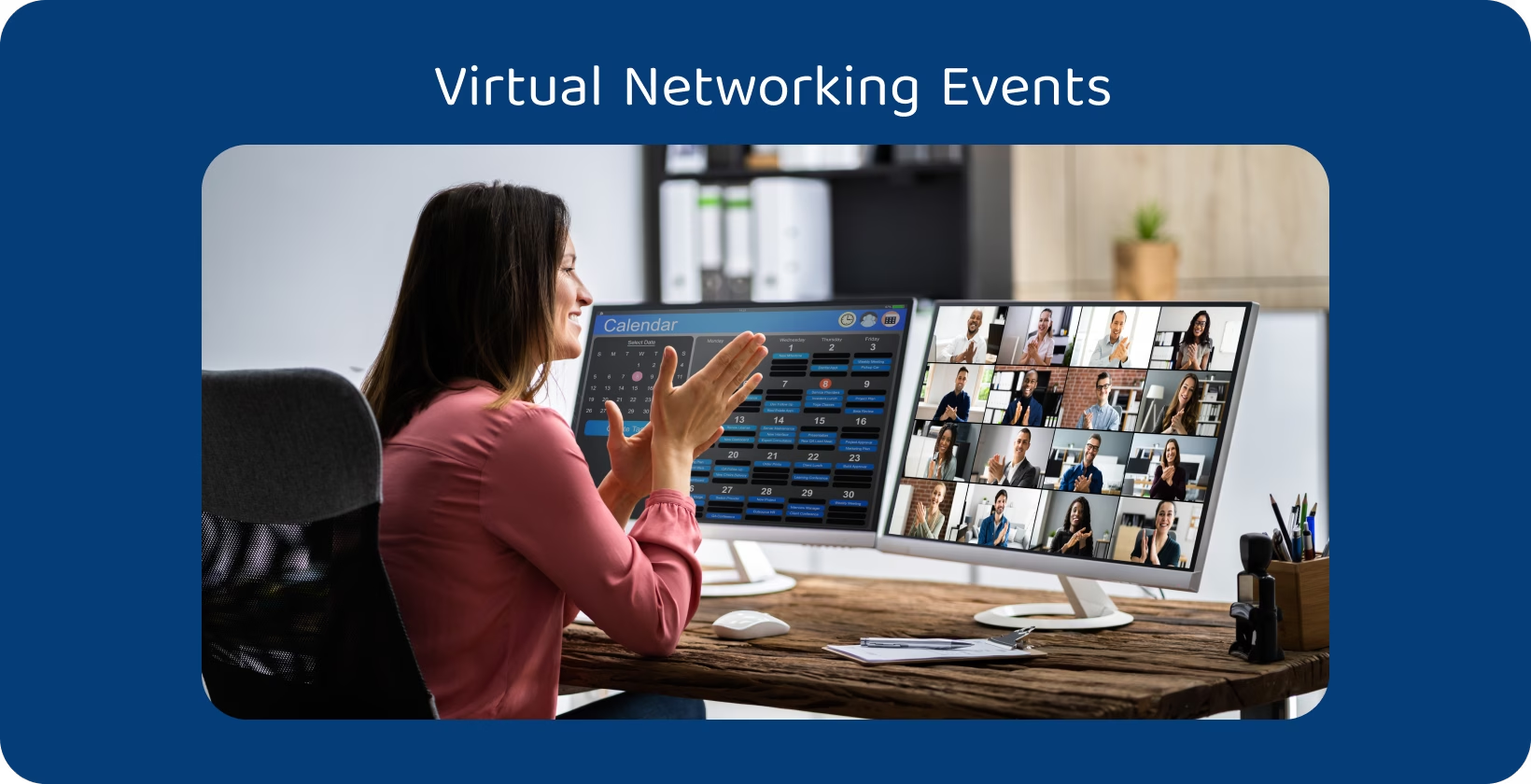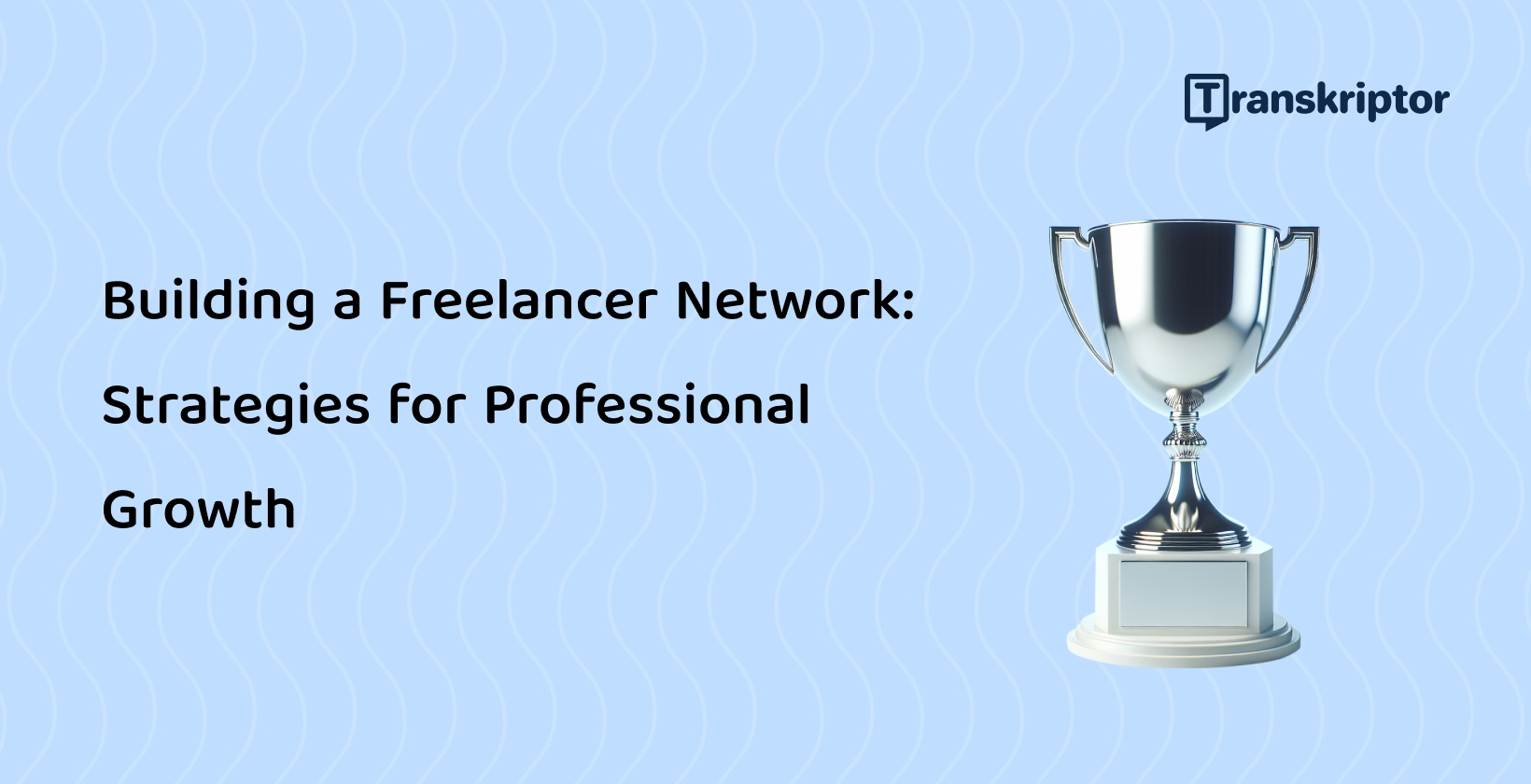In this context, integrating tools like Transkriptor into their networking strategy can prove to be a game-changer. Transkriptor , an advanced transcription tool, facilitates better documentation of interviews, meetings, and networking conversations, allowing freelancers to focus on building relationships rather than worrying about missing out on critical details.
The 12 strategies to build a professional network are listed below.
- Attend Industry Events and Conferences: Participating in these events allows freelancers to meet potential clients, collaborators, and mentors while keeping up with the latest trends in their sector.
- Join Online Professional Groups and Forums: This approach offers continuous networking opportunities across global platforms without the limitations of physical presence.
- Leverage Social Media Platforms: Using social media strategically can help freelancers connect with a wider audience, showcase their work, and engage with content relevant to their industry..
- Regularly Update Your Online Portfolio: An up-to-date portfolio showcases a freelancer's current skills and projects to potential clients.
- Participate in Workshops and Training Sessions: These educational events are opportunities for skill enhancement and networking with peers.
- Offer to Speak or Conduct Webinars: By sharing expertise through speaking engagements or webinars, freelancers can establish themselves as industry experts, attracting attention from potential clients and collaborators.
- Collaborate on Projects with Other Freelancers: Teaming up with others can lead to tackling larger projects and learning new skills.
- Request and Provide Recommendations and Testimonials: Exchanging positive feedback with clients and peers builds credibility and strengthens professional relationships.
- Engage in Local Community Events: Getting involved in local events can expand a freelancer's network beyond their professional circle, introducing them to potential clients in a more relaxed setting.
- Use Networking Platforms Specifically for Freelancers: Platforms designed for freelancers offer targeted opportunities for finding work, learning, and connecting with like-minded professionals.
- Regularly Reach Out to Past Clients and Colleagues: Keeping in touch with former clients and coworkers can lead to repeat business or new referrals.
- Attend Virtual Networking Events: These digital events allow freelancers to network with professionals globally from the comfort of their own homes.

1. Attend Industry Events and Conferences
Attending industry events and conferences is one of the most effective strategies for professional growth. These gatherings unite professionals, experts, and organizations in specific sectors, offering freelancers opportunities to connect with potential clients, collaborators, and mentors while staying updated on industry trends.
Freelancers should select events aligned with their expertise or professional interests, set clear objectives like meeting new contacts or gaining insights into industry trends, and craft a concise introduction highlighting their services and skills.
It’s essential to actively participate, including asking questions, engaging in discussions, and networking during breaks. Freelancers should carry business cards or a digital alternative for easy contact sharing, and follow up with personalized messages to foster meaningful professional relationships.
2. Join Online Professional Groups and Forums
Engaging in online professional groups and forums is a strategic networking approach for freelancers in the digital era. These digital platforms offer continuous global networking opportunities, allowing diverse connections and interactions without the constraints of physical events.
These platforms encompass LinkedIn groups, specialized forums, and social media communities. Freelancers should first identify and join platforms relevant to their field to maximize the benefits of online groups and forums.
Active participation is crucial for establishing presence and credibility within these communities. Freelancers are able to actively participate by contributing to discussions, sharing expertise, and connecting with professionals worldwide.
Maintaining an up-to-date and professional online profile is equally important, as it is the initial point of contact with potential clients and collaborators. Freelancers should also proactively initiate contact with other members for advice, potential collaborations, or sharing opportunities, fostering meaningful professional relationships.

3. Leverage Social Media Platforms
Utilizing social media platforms is a dynamic networking strategy for freelancers, breaking down geographical barriers and connecting them with a global audience. This approach involves creating and sharing industry-relevant content, engaging with peers, and connecting with potential clients to build a professional brand.
Solopreneurs should choose platforms that align with their industry and target audience to maximize the benefits of their freelancer network. Creating a professional, engaging profile that showcases skills and experiences is essential. It’s crucial to regularly post relevant content such as industry insights, portfolio pieces, or thought leadership articles.
Engaging with others' content is equally vital. Liking, commenting on, and sharing posts from one's network and industry leaders enhances visibility and helps establish relationships.
Consistency is key in social media networking. Regular activity and engagement are essential for developing and nurturing a robust professional freelancer network.
4. Regularly Update Your Online Portfolio
Maintaining an updated online portfolio is a vital networking strategy for freelancers. This entails regularly showcasing their work on personal websites or professional platforms like Behance, Dribble, LinkedIn, or industry-specific sites.
The goal is to exhibit freelancers' skills, projects, and achievements to potential clients and peers. An up-to-date portfolio is a dynamic resume, reflecting professional growth and evolution.
Freelancers should ensure their portfolio platforms are user-friendly and accurately represent their professional image. It's essential to feature a diverse range of projects, demonstrating both the breadth and depth of their skills.
Solopreneurs should consistently add new work, illustrating their ongoing involvement and progress to keep portfolios engaging and current. Including detailed project descriptions and context is crucial to help viewers understand their roles and contributions.
Active promotion of portfolios through social media channels and professional networks enhances visibility. Freelancers should keep contact information up-to-date and easily accessible, facilitating connections with potential clients or collaborators.
5. Participate in Workshops and Training Sessions
Participating in workshops and training is a valuable networking strategy for freelancers. This activity allows them to improve their skills while connecting with like-minded professionals. Solopreneurs are able to stay up-to-date in their field, build their freelancer network, and expand their skill set.
Freelancers should actively seek relevant workshops and courses offering learning and networking opportunities. Engaging in discussions, asking questions, and sharing insights during these events enhances the experience.
Following up with speakers or trainers provides valuable insights and connections. Contacting new acquaintances through LinkedIn or email is important to nurture professional relationships.
Sharing insights and experiences from these sessions on social media or professional networks is a good practice, demonstrating a commitment to professional development to a broader audience.
6. Offer to Speak or Conduct Webinars
Offering to speak or host webinars is a proactive networking strategy for freelancers that showcases their expertise and thought leadership. Specialists establish authority in their fields, attracting potential clients and collaborators by sharing their knowledge and insights.
Freelancers should identify valuable topics in their field, create compelling proposals or presentation outlines, and engage with their audience through engaging, informative, and tailored presentations. Incorporating storytelling and real-life examples makes presentations more relatable and memorable. Solopreneurs should also interact with the audience through Q&A sessions or networking opportunities after the presentation.
Promoting speaking engagements on social media and professional networks before and after the event is crucial for maximizing reach. Maintaining a portfolio of past presentations or articles improves credibility when approaching organizers.
Seeking feedback after presentations helps freelancers continuously improve their presentation skills and content relevance.

7. Collaborate on Projects with Other Freelancers
Collaborating with other freelancers is an interactive networking strategy that involves partnering on projects. This approach allows solopreneurs to combine skills and resources to tackle more substantial or complex work and encourages innovation and creativity.
Freelancers should identify peers with complementary skills or a shared target market through networking events, social media, or professional forums to start promptly. Clear communication about roles, expectations, and collaboration terms is crucial for a smooth partnership. Also, regular check-ins keep projects on track.
Independent contractors should also be open to learning from their collaborators and exchanging testimonials or referrals after project completion to boost future opportunities. Sharing the final work on their networks showcases collaborative success and extends its reach.
8. Request and Provide Recommendations and Testimonials
Seeking and giving recommendations and testimonials involves gathering positive feedback from satisfied clients and endorsing colleagues and collaborators. These endorsements serve as valuable social proof, affirming freelancers' expertise and track record while fostering goodwill and strengthening professional relationships.
Freelancers should start by identifying satisfied clients and requesting testimonials, specifying where these testimonials should be posted (e.g., LinkedIn, Upwork, Fiverr, personal website). Solopreneurs should be authentic and specific about the person's skills and contributions to make the endorsement more meaningful when writing recommendations for others.
Expressing gratitude to those who provide testimonials is essential as it nurtures professional relationships, encourages ongoing support, and leads to future collaborations.
9. Engage in Local Community Events
Engaging in local community events means participating in activities within a freelancer's immediate area that go beyond his professional circle. These events include charity activities, local festivals, or community service projects.
The goal is to connect with diverse people, including potential clients and collaborators, in a relaxed, community-oriented environment.
Freelancers should start by researching local events and volunteering their skills. Maintaining a subtle approach and prioritizing building genuine relationships over immediate business opportunities is important. Carrying business cards is helpful for professional connections when relevant.
Consistently participating and genuinely engaging in community events are essential for solopreneurs. These activities help establish a strong presence and reputation within the local community, laying the groundwork for future professional opportunities.
10. Use Networking Platforms Specifically for Freelancers
Using freelancer-focused networking platforms is a targeted way to build professional connections. These platforms include freelance job boards, forums, social media groups, and membership-based networks.
The main benefit of these platforms is their direct access to a concentrated pool of potential clients, collaborators, and resources tailored to freelancers.
Independent contractors should identify platforms relevant to their field and create a compelling profile showcasing their skills and experience to get started. Active participation involves engaging in discussions, sharing insights, and responding to others' questions. Freelancers are able to use platform resources like job boards and educational materials to improve their skills and find new opportunities.
Networking on these platforms involves being a helpful resource to others, offering advice, sharing experiences, and connecting other freelancers with opportunities whenever possible.
11. Regularly Reach Out to Past Clients and Colleagues
Regularly reaching out to past clients and colleagues is a freelancer networking strategy that nurtures existing professional relationships. This helps keep the network active, leading to potential repeat business, referrals, or new opportunities.
Solopreneurs ensure that their services are considered for future projects and recommendations to others by staying in touch with past clients and colleagues.
Solopreneurs should establish a schedule or system for maintaining contact with their network. Personalizing their communication is important, tailoring it to each relationship and previous interactions.
Freelancers should balance being informative and friendly, avoiding an overly sales-oriented approach when reaching out to past clients. The primary goal is maintaining a connection rather than aggressively promoting their services.

12. Attend Virtual Networking Events
Engaging in virtual networking events is a modern approach that takes traditional networking online. This strategy involves participating in digital gatherings like webinars, virtual conferences, and online meetups, all designed for professional networking.
Virtual events eliminate geographical limits, allowing freelancers to connect with professionals globally. Independent contractors should identify those relevant to their field and professional goals to make the most of these events. Actively participating in discussions and sessions boosts their visibility, and engaging with speakers and attendees through questions or comments is valuable.
Using the event's networking features, like breakout rooms or chat functions, initiates conversations with other participants. Following up with contacts is crucial after the event. Sending personalized messages or LinkedIn connection requests mentioning the event and specific conversations helps solidify these new connections.
What is the Importance of Networking in Freelancing?
The importance of networking in freelancing is multifaceted and deeply impactful, playing a critical role in the growth and sustainability of a freelancer's career. Networking is a vital bridge connecting freelancers to a world of possibilities and opening doors to opportunities and business growth. This activity enables them to access diverse projects, clients, and markets by engaging with peers, clients, and industry experts.
Collaborating with other solopreneurs and professionals leads to innovative projects, enhancing their portfolio and credibility. Networking informs freelancers about industry trends and emerging opportunities, giving them a competitive edge in a changing landscape.
The strength of a freelancer's network is not just about the number of connections but the quality of relationships. Genuine, mutually beneficial connections result in collaborations that expand a contractor's capabilities and reach.
Enhancing Freelancer Success with Transkriptor
In the world of freelancing, networking remains a cornerstone for uncovering new opportunities and fostering professional growth. Beyond traditional networking strategies, integrating innovative tools like Transkriptor can significantly enhance a freelancer's ability to connect and collaborate. Try it for free!
Transkriptor, a cutting-edge transcription tool, offers a unique advantage by converting audio and video content into text, facilitating easier sharing and discussion of work among peers, potential clients, and collaborators. This not only streamlines the process of showcasing one's skills and achievements but also supports the creation of a dynamic, multimedia portfolio that can be easily disseminated across one's network. By leveraging Transkriptor, freelancers can ensure their work is accessible and engaging, further solidifying their professional relationships and expanding their freelance network.

